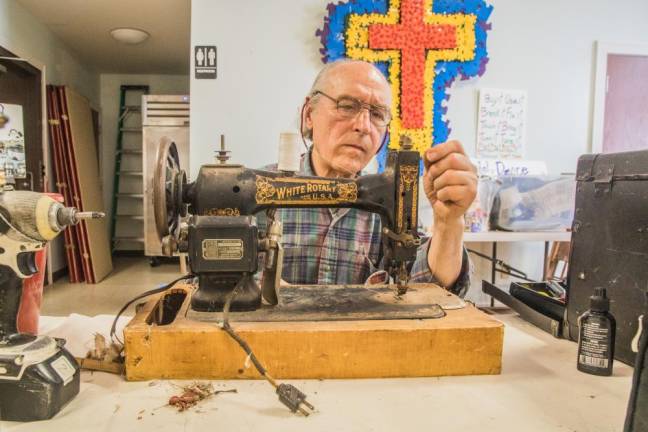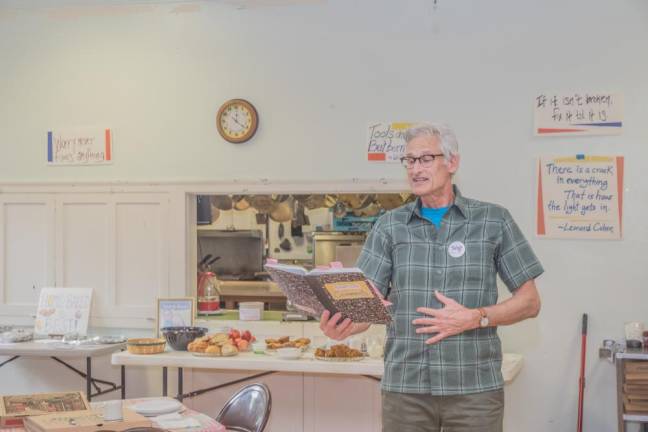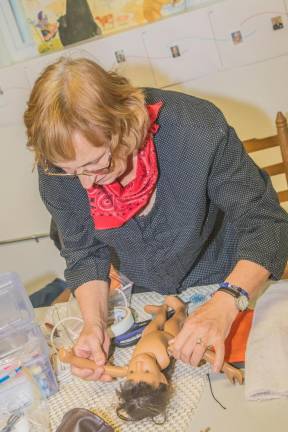Patchword radicals
Two leaders of the Hudson Valley’s pioneering fix-it culture team up to write the repair manifesto



When she was a kid, Elizabeth Knight wore a new brown jumper to school and tore it. Her mom, skilled with a needle and thread, didn’t fix it with a few subtle stitches. Instead, she cut out a patch the shape of a lily pad and sewed it on – a new pocket, with a little felt frog on top of it with even littler beaded eyes.
Knight’s mother, a daughter of the Depression, would have been called a seamstress back then. With its dainty, gendered, perhaps hard-up connotations, that word didn’t do full justice to the creativity of her craft. There is a neologism that Knight likes better: “sewist,” a mash-up of sew and artist.
Repair Revolution: How Fixers are Transforming Our Throwaway Culture (2020), by Knight and John Wackman, is peppered with the lexicon of the new guard: Transition Towns, circular economy, mendfulness, homecrafting, and wabi-sabi, the Japanese aesthetic philosophy prizing the beauty of imperfection.
You’ve probably already heard the term Repair Café: a free community fix-it clinic, where once every month or two, handy neighbors take over a church or town hall for the day and volunteer to repair less-handy neighbors’ beloved but broken objects. Exported from Amsterdam in 2009, Repair Cafés have sprouted up in the Hudson Valley faster than anywhere else in the country.
Why here? “Because of the Hudson River,” said Wackman, who founded the region’s first Repair Café in New Paltz in 2013 after reading about them in the New York Times. “The battle for the Hudson River really is the story of the birth of the modern environmental movement. There’s an ethos in the Hudson Valley that is really responsive, and it’s about our responsibility to future generations.”
Knight first heard about Repair Cafés in 2016, when she read about one in Westchester in the pages of this magazine. She brought a wonky lamp (fun fact: lamps are the number one item nationwide brought in for repair) to the Café, which was held at a beautiful former library on Beacon’s Main Street. There, she saw teenage boys sitting with an adult working on an electric guitar; a little girl watching her stuffed animal being doctored; a young Japanese man wearing bright red plaid pants straight out of a 1920 Evelyn Waugh novel, Knight thought, being coached on how to pick out the hem of another pair of vintage pants so he could alter them. Meanwhile, the man trying to rewire Knight’s lamp got stuck, and called over another repair coach so they could put their heads together.
“It was just this hive of activity,” she said. “I thought, we need one. What community wouldn’t need and want that? It was so interactive, intergenerational. And the whole idea of fix it, don’t get a new one – not just because of sustainability issues but because the lamp had an emotional connection for me. I couldn’t go to Target and buy another one that meant what that lamp did.”
Looking around, she realized there was nothing like it in Orange County, not a fix-it clinic, tool library, nada.
Up to that point, Knight’s multifaceted career had been primarily in retail and graphics. “If you’d told me I was going to be in the quote sustainability business, I would have laughed,” she said.
But a Repair Café seemed like a slam dunk in terms of its potential to adjust our disposable mindset, while bringing together neighbors from all walks of life – not to mention both sides of the aisle. “I thought, I used to run special events for 20 stores, how hard can it be?” recalled Knight. Answer: “A lot harder than it needed to be.”
The biggest challenge was “staffing up”: finding handy folks to spend their Saturday fixing other people’s broken stuff, gratis. Knight, wrote letters to churches, clubs and local newspapers, put up fliers. She spoke at the senior center, where her talk – about growing up with a mom who sewed clothes and a dad who made bookshelves from World War II ammo boxes – seemed to resonate, until she asked for volunteers. Just one hand went up. It belonged to Jerry Fischetti, who ended up celebrating his 88th birthday behind the electrical repairs station at Warwick’s inaugural Repair Café.
She kept encountering a defeatist argument from locals: Warwick was such an affluent community that people were not going to be bothered to get something fixed, when they could just buy a new one.
Maybe it would be a flop. Then again, maybe not. There was only one way to find out.
At the eleventh hour, a core of 10 volunteers crawled out of the woodwork – the bare minimum she needed to make it work: sucess. Since then, the Warwick Repair Café has grown to involve 25 repair coaches from nine towns, serving 70 to over 100 “customers” on any given Saturday. Sister Cafés have sprouted up like weeds. Until the pandemic put them on hold, there were seven in Orange County, seven in Dutchess, eight in Ulster, seven in Westchester. Knight also masterminded a massive community Earth Day swap in Warwick called Too Good To Toss.
It was Knight’s post-game recaps of each Café, alive with quirky detail, that caught Wackman’s eye, prompting him to invite her to co-author the book he’d recently begun. A veteran author, with four books on tea and entertaining to her name, Knight signed on.
Their objective is a straightforward one: to spread the gospel of repair from sea to shining sea. “We really believe that every town ought to have one of these,” said Wackman. “And if not every town, then at least every county.” But Wackman and Knight share another motivation, too. Both launched their respective Cafés partly because they were new in town, and craved community. As a military brat who moved 22 times in as many years, Knight has spent a lifetime honing this skill. “You have to look for, where’s the hole that I could fit in?” she said. “I didn’t do a very good job of it in my teens, but I sure know how to do it now.”
The duo worked together for a year and a half to craft the book, with Wackman focused on the overarching philosophical and political aspects of the movement, while Knight interviewed over 100 fixers around the country. Ever practical, Knight put together the How Do I Get One of These in My Town? chapter, saving a lot of trouble for the next guy.
Covid has put the kabosh on Cafés, which thrive on sitting across from each other at a table, handing things back and forth – exactly like the virus. For now, repair goes on via Zoom; Wackman just helped troubleshoot a problematic door handle and locking mechanism for someone in Sweden.
And when we emerge from sitting quarantined in our houses, Knight believes it will be with a new appreciation for camaraderie and the collaborative spirit, coupled with a hunger to flex our human agency. “I think we all know now that we’re all in this together,” she said. “We all need to find a way out together, and that includes everyone.”
Like many a quarantined hobbyist, Knight recently fished out her needle and thread, embroidering a pair of 30-year-old jeans and patching the holes with scraps of industrial weight curtains – which was satisfying, though the craftsmanship left something to be desired. “I mean, I have no technical skills,” she said. Unlike her mother, Knight is never going to be an artist behind the sewing machine, which is fine by her.
She’s found her medium. “I now know all of these people who I would never have met. I know their stories,” said Knight. As soon as the shutdown lifts, Knight has visions of Café-hopping her way around the country, meeting “the wonderful, giving, funny, smart people” she’s been corresponding with for over a year. “That’s the thing that keeps me going is the stories.”